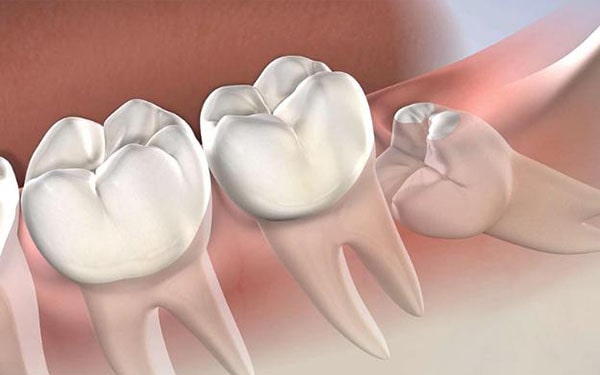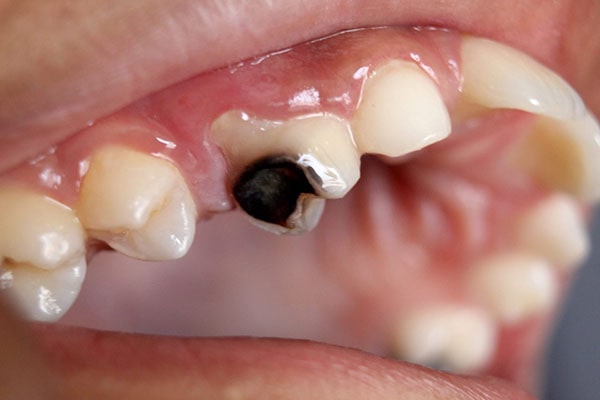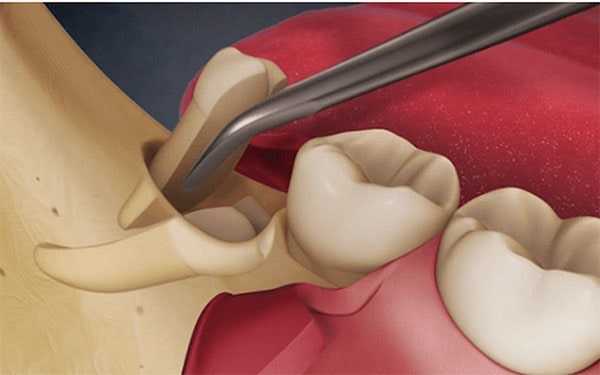Should the upper wisdom teeth be extracted?
Dr Nguyen Anh Ngoc – dentist at Home Dental shared that wisdom tooth extraction is necessary to avoid future dangers such as inflammation, gingivitis, jaw bone cysts, severe tooth decay, etc. In case both wisdom teeth in the upper and lower jaws grow straight and develop normally, you can keep them.
Contents
The role of wisdom teeth
Wisdom teeth are located at the last position on the jaw and usually erupt between the ages of 18 and 26. In the Stone Age, wisdom teeth were directly involved in the process of chewing, crushing food like the other molars. However, as humans evolve, the brain gradually gets larger in size. The jawbone needs to be smaller to be able to fit in the skull. As a result, there is not enough space left in the arch for wisdom teeth to erupt. Gradually, wisdom teeth have become useless.
Not only that, wisdom teeth that grow crooked or impacted also cause many dangers such as swelling, pain, inflammation, etc. If not handled in time, wisdom teeth will destroy the bones of adjacent teeth or even lead to the displacement of all teeth. More seriously, misaligned wisdom teeth can lead to many dangerous oral díease, affecting patients’ overall health and making the patients’ quality of life decrease.

When to extract wisdom teeth on the upper or lower jaw?
According to experts in the field of maxillofacial dentistry, you need to quickly remove your upper or lower wisdom teeth if you encounter the following cases:
Jaw infection or gingivitis
Jaw infection and gingivitis are the risks that many people face when wisdom teeth erupt. At that time, the gums are often swollen and there is pus around the roots of the teeth. Purulent inflammation can spread to many other areas in the oral cavity such as cheeks, jawbone, etc. The infection is often repeated until the wisdom teeth are fully grown or removed.
Severe jaw bone cyst
Wisdom teeth that are impacted and misaligned for a long time will damage the bone structure of adjacent teeth, causing jaw cysts. At that time, you need to quickly go to a reputable dental facility so that the dentist can check and have the most suitable wisdom tooth extraction plan for you. If not treated, jawbone cysts will cause prolonged pain and adversely affect your teeth.
Severe tooth decay
Most cases of decayed wisdom teeth are advised to be removed because this is the direct cause of prolonged pain and even inflammation of the pulp. In particular, if the tooth is too badly decayed but not removed in time, the bacteria will easily spread to the surrounding areas, causing many dangerous complications for the teeth.

Nerve compression
Not only does it adversely affect the jawbone, the misaligned wisdom teeth also affect the important nervous system. Therefore, the pain when wisdom teeth erupt is often severe and lasts much longer than other teeth in the jaw. In particular, there are many cases where wisdom teeth grow and press on nerves, causing loss of sensation and disorder of jaw reflexes. Extraction of wisdom teeth is the best solution for this situation.
Pain in the root of adjacent teeth
During the formation process, wisdom teeth often pierce the root of the second molar. However, the phenomenon is often not detected early because many people mistakenly believe that the pain is due to the eruption of wisdom teeth. The longer the wisdom teeth grow out of place, the more severely damaged the second molar will be, and the teeth may even become loose or fall out… You need to quickly remove the wisdom teeth to avoid these risks.
There are no symmetrical molars
According to many experts in the field of maxillofacial teeth, if there are no wisdom teeth growing in the symmetrical jaw, then tooth extraction is essential. Because then, the bite of the upper and lower jaws has no correlation. During the process of chewing, wisdom teeth will be the direct cause of damage to the opposite gum area.
If there are no above symptoms, should wisdom teeth be extracted?
Not all wisdom teeth need to be removed. You can keep your third molar in case:
- Wisdom teeth grow straight, develop normally, and do not affect the remaining teeth on the jaw.
- The surface of the wisdom teeth does not appear to have small grooves that can make food residues easily get stuck in and the oral hygiene process more difficult.
- Both wisdom teeth in the upper and lower jaws must grow straight, symmetrical with each other.
To know exactly whether wisdom teeth should be extracted or not, you need to visit a reputable dental facility. The dentists will directly examine the oral cavity, take X-rays of the jaw and advise the optimal solution.
The level of danger when extracting wisdom teeth on the upper and lower jaw
Just like other teeth extraction, extracting wisdom teeth is a basic surgical procedure. However, because wisdom teeth that need to be removed are often misaligned or impacted, the procedure of removing wisdom teeth is more complicated than that of other teeth. Although removing teeth in general and wisdom teeth in particular is often safe, there are still chances that complications can happen during or after the procedure. Experts in the field of maxillofacial dentistry have determined that wisdom teeth extraction on the lower jaw is more dangerous and risky than that on the upper jaw.
Complications when extracting upper wisdom teeth
The wisdom teeth on the upper jaw often tend to grow straight, so the extraction procedure is relatively simple, safe, and not dangerous. You will only encounter complications and risks when choosing a unprofessional dental facility, a dentist with no high expertise:
- The wound is infected and swollen because the tooth extraction process is not done in an absolutely sterile environment.
- Loss of sensation in the jaw due to the affected nerve.
- Anesthesia poisoning as the doctor injected the wrong dose.
Possible risks when extracting lower wisdom teeth
The lower jaw is smaller than the upper jaw, so it is common that there is not enough room for wisdom teeth to develop normally. The lower wisdom teeth often tend to be impacted. Therefore, the process of tooth extraction will be much more complicated and difficult. Just by a small mistake by the dentist during the procedure, you can face the following risks:
- Wisdom teeth in the lower jaw are located closer to the nerves than in the upper jaw. In the process of tooth extraction, if the dentist performs the wrong technique, the nerves may be affected, affecting pronunciation or causing loss of taste, etc
- When extracting the lower wisdom tooth, the risk of blood clot rupture is often higher, causing prolonged bleeding, infection of the extraction site, etc.
Should only the upper or lower wisdom teeth be extracted?
Experts in the field of dentistry often advise against removing wisdom teeth in only one jaw. Because at that time, a disproportionate bite of the two jaws may occur, adversely affecting the gums and the remaining teeth on the jaw.
Only remove the upper wisdom teeth
Although the size of the upper jaw is usually larger, in reality, there are many people who experience the situation of impacted wisdom teeth in the upper jaw, while the lower teeth grow straight. At that time, they will think of only removing the upper wisdom teeth to reduce pain and save costs.
However, keeping wisdom teeth in the lower jaw can prolong the healing time of upper jaw injuries. In the process of chewing, the teeth will collide with the gums, breaking blood clots, making the incision prone to inflammation, swelling, and prolonged pain.
Only remove the lower wisdom teeth
Leading experts have shared, after removing wisdom teeth in the lower jaw, you should continue to remove the upper wisdom teeth. Because if we only extract the lower wisdom teeth, the teeth in the two jaws will appear asymmetrical. Gradually, the upper wisdom teeth will tend to come down, making it easy to bite into the gums during chewing.
In addition, this also creates a gap with adjacent teeth. This is a favorable condition for food residue to stick, causing gum diseases such as tooth decay, periodontitis …
Where to go for the upper wisdom teeth extraction?
Home Dental is the first system in Vietnam to inherit the strict standards of German. The clinic gathers a team of qualified doctors with years of experience in the field. Experts will directly participate in the consultation and treatment of difficult and complicated wisdom tooth extraction cases.
Home Dental is located at 30 Trieu Viet Vương, Hai Ba Trung, Hanoi. The clinic is fully equipped with the most modern technology and equipment. As a result, the process of wisdom tooth extraction takes place quickly and accurately, minimizing possible complications.
Above are some basic information related to the topic “Should wisdom teeth be extracted?”. Hopefully, this article will give you some useful knowledge to consider carefully before getting wisdom teeth removed.

